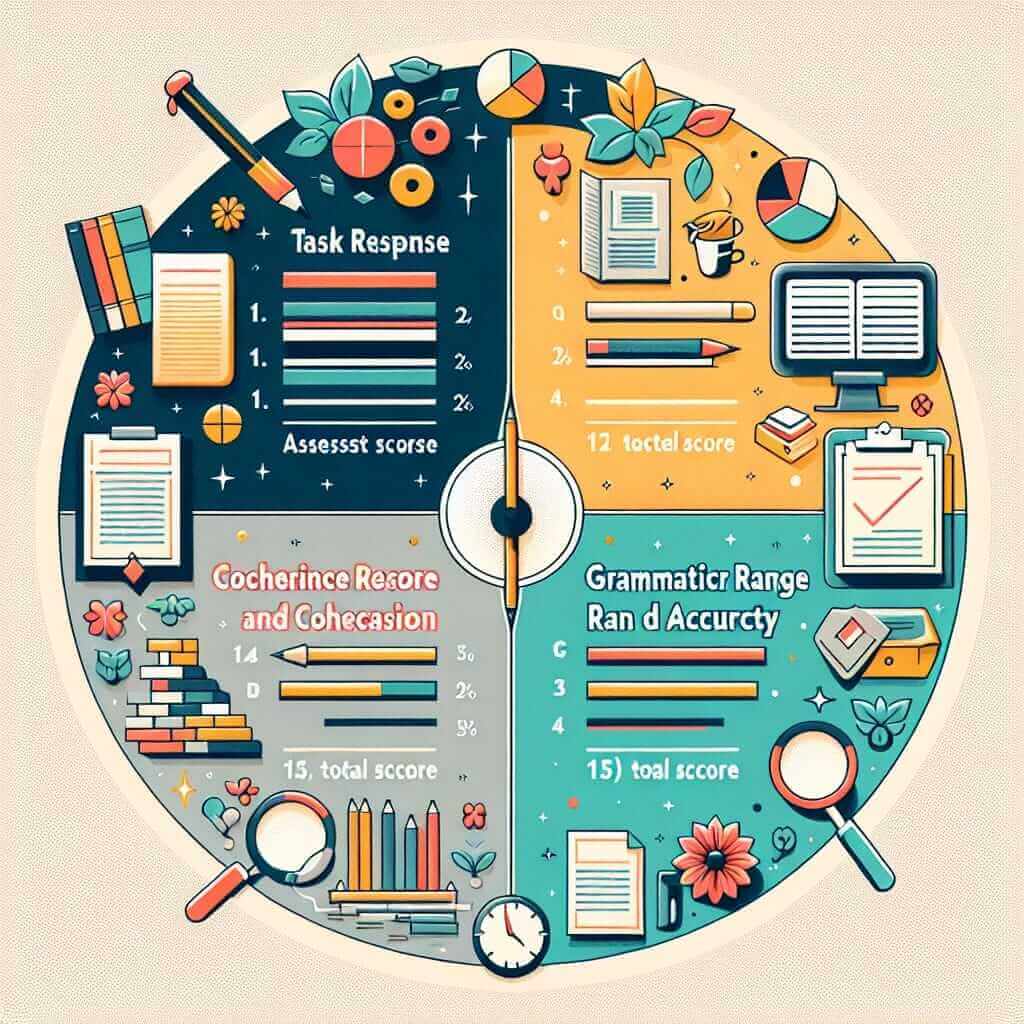As an IELTS instructor with over two decades of experience, I understand the significance of the writing section in achieving your desired IELTS band score. Many candidates find this section particularly daunting, especially when unsure of the marking criteria. Understanding how IELTS Writing is assessed is crucial for effective preparation. This guide will provide a comprehensive overview of the marking scheme, offering valuable insights and tips to help you excel in your IELTS Writing test.
Understanding the IELTS Writing Marking Criteria
Whether you’re taking the IELTS Academic or General Training, the Writing test is assessed based on four key criteria:
1. Task Response (or Task Achievement):
- This criterion assesses how well you address all parts of the task, present a clear position, and develop your ideas with relevant supporting details and evidence.
- In the Academic module, Task 1 requires you to summarize, describe, or explain visual information, while Task 2 is an essay requiring you to present your perspective on a given topic.
- For the General Training module, Task 1 involves writing a letter, while Task 2 is an essay, usually less formal than the Academic essay.
2. Coherence and Cohesion:
- This criterion focuses on the logical organization and flow of your writing.
- You need to present your ideas in a clear and cohesive manner, using appropriate linking words and discourse markers to connect your thoughts effectively.
- Paragraphing should be well-structured, ensuring a smooth transition between ideas and paragraphs.
3. Lexical Resource:
- This criterion evaluates the range and accuracy of your vocabulary.
- Examiners look for your ability to use a variety of vocabulary appropriately and accurately, showcasing your understanding of subtle differences in meaning.
- Avoid repeating the same words or phrases excessively and demonstrate your lexical flexibility.
4. Grammatical Range and Accuracy:
- As the name suggests, this criterion assesses your grammar usage.
- Examiners evaluate your ability to use a variety of grammatical structures accurately and appropriately.
- This includes using complex sentence structures, different tenses, and correct punctuation.
How Each Criterion is Weighted
Each of the four criteria contributes equally to your overall Writing band score. This means each criterion holds 25% of the total score. Therefore, it’s essential to pay equal attention to all four areas during your IELTS Writing preparation.

Examples of Writing Tasks and How They Are Marked
Let’s look at some examples of how the marking criteria apply to real IELTS Writing tasks:
Example 1: IELTS Academic Writing Task 1
You are presented with a graph showing the population growth of three different cities over 50 years. Your task is to summarize the information by selecting and reporting the main features and making comparisons where relevant.
How it’s marked:
- Task Response: Your answer should accurately reflect the information on the graph, highlighting key trends and comparisons. You should avoid including irrelevant information or personal opinions.
- Coherence and Cohesion: Your response should be well-organized, using appropriate linking words to connect information logically. Paragraphing should be clear and help the reader follow your analysis.
- Lexical Resource: Use a variety of vocabulary related to trends, comparisons, and data interpretation. Avoid repetition and use synonyms appropriately.
- Grammatical Range and Accuracy: Employ a range of grammatical structures, such as different tenses and complex sentences, to convey the information accurately and effectively.
Example 2: IELTS General Training Writing Task 2
You are asked to give your opinion on the following topic: “Some people believe that children should be allowed to use mobile phones in school, while others disagree. Discuss both views and give your own opinion.”
How it’s marked:
- Task Response: Clearly state both sides of the argument, providing relevant supporting details for each. Then, present your own well-developed opinion on the issue.
- Coherence and Cohesion: Organize your essay logically, ensuring a clear flow of ideas. Use appropriate linking words to connect paragraphs and sentences, guiding the reader through your arguments.
- Lexical Resource: Demonstrate a wide range of vocabulary related to education, technology, and arguments. Use vocabulary accurately and effectively to convey your points.
- Grammatical Range and Accuracy: Show command of a range of grammatical structures, including complex sentences, conditionals, and a variety of tenses. Ensure accuracy in grammar and punctuation throughout your essay.
Tips to Improve Your IELTS Writing Score
-
Understand the band descriptors: Familiarize yourself with the IELTS band descriptors for Writing to comprehend what each band level requires. This will help you focus your efforts on areas needing improvement.
-
Practice regularly: Consistent practice is crucial. Write essays and reports on various topics, simulating exam conditions whenever possible. Seek feedback from experienced IELTS instructors to identify areas for improvement.
-
Expand your vocabulary: Make a conscious effort to learn new words and phrases, paying attention to their accurate usage and collocations. Use these words in your writing practice to enhance your lexical range.
-
Master grammar rules: A strong grasp of grammar is essential. Review grammar rules regularly and practice using various grammatical structures in your writing.
-
Proofread carefully: Always proofread your work thoroughly to eliminate grammatical errors, spelling mistakes, and punctuation issues. These errors can significantly impact your score, so develop a keen eye for detail.
Conclusion
Scoring high on the IELTS Writing test requires a thorough understanding of the marking criteria and consistent effort in developing your writing skills. By focusing on task response, coherence and cohesion, lexical resource, and grammatical range and accuracy, you can significantly enhance your chances of achieving your desired band score. Remember to practice regularly, seek feedback, and stay dedicated to improving your writing proficiency. Good luck!